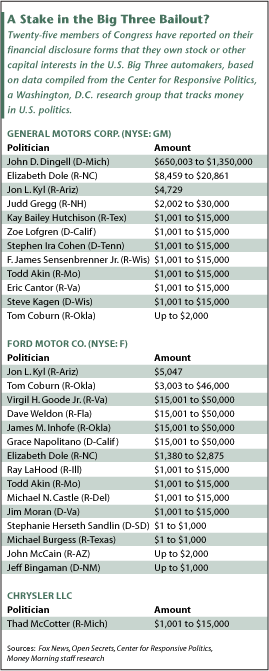By William Patalon III
Executive Editor
Money Morning/The Money Map Report
With the U.S. “Big Three” of General Motors Corp. (GM), Ford Motor Co. (F), and Chrysler Corp. seeking as much as $34 billion in bailout money, there’s a lot at stake for the American auto industry.
There would also be quite a bit at stake for Congress, given the personal stakes that elected officials own in the automakers, FoxBusiness.com reports.
According to published reports, 25 members of the U.S. Congress have reported on their financial disclosure forms that they own stock in – or have other capital interests in – the Big Three, based on data compiled from the Center for Responsive Politics, a Washington, D.C., research group that tracks money in U.S. politics. [Editor’s Note: Fox News senior information specialist James Farrell pulled the data displayed in the accompanying chart, which was created by Money Morning staffers].
Details of the Bailout
The Big Three initially sought $25 billion in loans – and were almost laughed out of Washington after the chief executive officers of the three companies traveled to Capitol Hill in their corporate jets. And while the new plans include such politically palatable moves as salary cuts for top-tier executives, the sale of cushy corporate jets and the elimination of moribund brands, the three embattled U.S. automakers are also now seeking government aid of as much as $34 billion – which is as much as $9 billion more than that initial $25 billion figure that had been on the table from the very beginning of the industry’s bid for bailout money.
Here’s the breakdown:
- General Motors, the largest domestic automaker, said late yesterday that it is seeking as much as $18 billion to survive into 2010 – and that it needs $4 billion of that cash just this month in order to dodge a bankruptcy filing. GM is seeking a loan of $12 billion. It’s also requesting an additional $6 billion line of credit to provide more cushion, should the severe current market downturn persist.
- Ford is asking for $9 billion. The Dearborn, Mich.-based carmaker hopes it won’t need to utilize the federal loans, and that it just wants to have access to the capital as a backstop. Ford is aiming to return to profitability by 2011.
- Chrysler confirmed its previous request for a $7 billion loan that its executives detailed during Congressional hearings two weeks ago. But it now says that it needs the loans by the end of the year if it’s to survive, because its projected year-end cash reserves of $2.5 billion won’t come close to covering its projected major first-quarter expenses of $11.6 billion, Dow Jones Newswires reported. The loans – coupled with Chrysler’s ongoing restructuring efforts – would keep that carmaker operating through the end of March. But it will need to access the capital before the end of this year.
Ethical Issues?
According to Fox News’ Farrell, judicial ethics rules “prevent any bankruptcy judge with holdings in a company from presiding over a bankruptcy case. Essentially deciding whether the company has to file seems to be a little different.”
Added Farrell: “If GM files for bankruptcy, the stock held by the politicians becomes essentially worthless overnight because they would be unsecured creditors at the absolute bottom of the bankruptcy food chain,” noting that, at a minimum, all shareholders “would get a significant haircut.”
 So why is this an issue for Congress? Currently, the bailout of the U.S. auto industry bailout is actually being debated as a specific piece of new legislation. But whether it gets enacted as an amendment to the initial legislation that actually created the Troubled Asset Relief Program (TARP) is not yet clear.
So why is this an issue for Congress? Currently, the bailout of the U.S. auto industry bailout is actually being debated as a specific piece of new legislation. But whether it gets enacted as an amendment to the initial legislation that actually created the Troubled Asset Relief Program (TARP) is not yet clear.
But if it is new legislation, all of Congress will have to vote on it.
Already, U.S. Sen. Elizabeth Dole, R-N.C., who lost her re-election bid, and U.S. Rep. Michael Castle, R-Del., and a number of other Congressmen who own stakes sit on committees that conducted the first hearings on the auto industry bailout request prior to Thanksgiving, Fox News reported.
U.S. Rep. John Campbell, R-Calif., said he only will vote “present” on any automaker bailout, since, as the former owner of a car dealership, still owns land on which his former business sits. According to Rep. Campbell’s staff, Campbell doesn’t even want the appearance of a conflict of interest. But a report indicates Campbell voted “yes” on the financial bailout.
The information on the lawmakers’ holdings came from Congress’s 2007 financial disclosure forms, filed in May 2008, the most recent data available. Members of Congress are not required to report actual dollar sums. Instead, they are allowed to report dollar ranges.
Note: The wife of U.S. Rep. John Dingell is the executive director for public affairs for General Motors, and a descendant of the Fisher brothers, who founded the company that became General Motors 100 years ago, Fox News said.
While Dingell’s spouse, Deborah Dingell, does not lobby Congress or the administration on GM’s behalf, “she makes the case for the company, the auto industry and the state of Michigan in public and in private,” a recent New York Times story says.
News and Related Story Links:
- FoxBusiness.com: EMAC blogs:
The Congressmen Who Own Stakes in the Automakers. - New York Times:
A Power Duo, Dingells Battle on Two Fronts
About the Author
Before he moved into the investment-research business in 2005, William (Bill) Patalon III spent 22 years as an award-winning financial reporter, columnist, and editor. Today he is the Executive Editor and Senior Research Analyst for Money Morning at Money Map Press.



